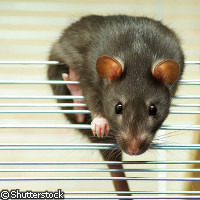Human cowpox cases caused by pet rats, study shows
At the beginning of 2009, four young women were admitted to hospital in the northern French town of Compiègne suffering from fever and blackish lesions on their skin. The patients were eventually diagnosed with cowpox, and recovered following treatment. According to EU-funded researchers, all four were infected after being scratched by a pet rat. The researchers warn that as exotic pets increase in popularity, cases like this may well become more common. They also call for the establishment of diagnostic capacity to identify emerging pathogens as quickly as possible. EU support for the work came from two projects: RIVIGENE ('Genomic inventory, forensic markers and assessment of potential therapeutic and vaccine targets for viruses relevant in biological crime and terrorism'), which was financed under the 'Research for policy support' budget line of the Sixth Framework Programme (FP6); and EVA ('European virus archive'), which is funded under the Capacities programme of the Seventh Framework Programme (FP7). The cowpox virus is found across western Europe, mostly in wild rodents, such as rats. Infections in humans are rare, and the few recorded cases have been caused either through handling wild rodents, or from a pet cat that has been infected while hunting wild rodents. Symptoms include fever and blackish lesions on the skin. The disease is usually not serious in humans; the lesions heal spontaneously after six weeks. In the current study, the doctors initially thought that the patients were suffering from rickettsiosis, which is caused by Rickettsia bacteria. However, laboratory analyses soon revealed that in fact the women were all infected with the same strain of cowpox virus. All four patients recovered following appropriate treatment. Interviews with the patients revealed that none of them had pet cats or had handled wild rodents - the usual factors found in cases of cowpox in humans. However, all had either bought a pet rat from a certain pet shop in December 2008 or January 2009 or, in one case, visited a friend with pet rats (including one bought from the same shop during the same period). Furthermore, all four patients had been scratched by the pets, which had fallen ill and died not long after being purchased. The researchers subsequently traced the infected rats back to a rat breeder in the Czech Republic. Meanwhile, further cases of cowpox have been reported in France, suggesting that the outbreak may be larger than initially thought. According to the researchers, the findings emphasise 'the need for extreme caution when humans adopt animals of exotic origin as pets'. They conclude, 'Our study justifies the establishment of a national diagnostic capability and the corresponding human expertise to enable rapid diagnosis and identification of human pathogens that can cause unimaginable levels of disease in our communities.'
Countries
France



